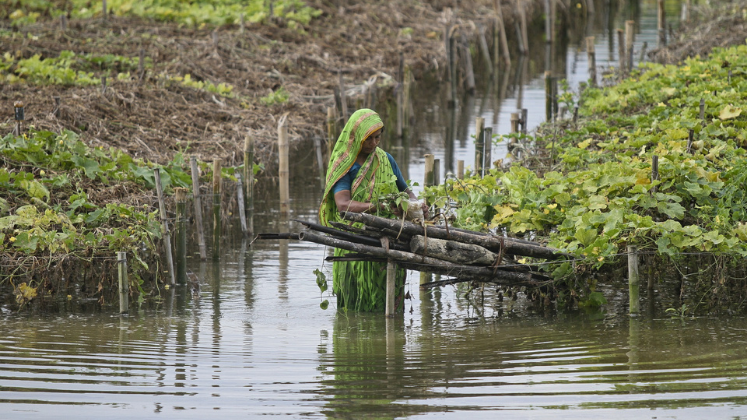In Community Economies in the Global South: Case Studies of Rotating Savings and Credit Associations and Economic Cooperation, Caroline Shenaz Hossein and Christabell P. J. bring together case studies of – and highlight the connections between – women-led rotating savings associations in Latin America, the Caribbean, Africa, and Asia. By showcasing these thriving, anti-capitalist organisations in the Global South, the book makes a compelling case for a community-orientated approach to structuring our economies, writes Swetarani Tripathy.
Community Economies in the Global South: Case Studies of Rotating Savings and Credit Associations and Economic Cooperation. Caroline Shenaz Hossein and Christabell P.J. (eds). Oxford University Press. 2022.
 The International Labor Organization Report 2020 states that over 630 million workers face moderate to extreme poverty, and disproportionately reside in the Global South. The top-down approach of the mainstream literature perceives the population of the Global South, specifically women, as being without agency and hence their day-to-day struggles and survival strategies are sidelined in the dominant discourse. The notion that the informal economy of the Global South should be formalised fails to properly account for numerous activities performed by poor women who sustain livelihoods. The collective efforts of these women who have been pushed to the margins of their economies are devalued. This volume edited by Caroline Shenaz Hossein, Associate Professor of Global Development and Political Science at the Department of Global Development Studies, University of Toronto and Christabell P.J, Associate Professor of Economics at the University of Kerala is an attempt to flip this narrative of marginalisation, deprivation and exclusion to a narrative of cooperation and equity.
The International Labor Organization Report 2020 states that over 630 million workers face moderate to extreme poverty, and disproportionately reside in the Global South. The top-down approach of the mainstream literature perceives the population of the Global South, specifically women, as being without agency and hence their day-to-day struggles and survival strategies are sidelined in the dominant discourse. The notion that the informal economy of the Global South should be formalised fails to properly account for numerous activities performed by poor women who sustain livelihoods. The collective efforts of these women who have been pushed to the margins of their economies are devalued. This volume edited by Caroline Shenaz Hossein, Associate Professor of Global Development and Political Science at the Department of Global Development Studies, University of Toronto and Christabell P.J, Associate Professor of Economics at the University of Kerala is an attempt to flip this narrative of marginalisation, deprivation and exclusion to a narrative of cooperation and equity.
The notion that the informal economy of the Global South should be formalised fails to properly account for numerous activities performed by poor women who sustain livelihoods
As Beverley Mullings (2021) points out, despite the exclusionary capitalist systems, the precariat in the Global South is seeking agency through cooperation among its immediate communities in order to offset “the dehumanizing logic of neo-liberal capitalism”. As an extension to this idea, Community Economies in the Global South is a volume of empirical and narrative-based studies of the varied ways people, specifically women in Latin America, Africa and Asia organize themselves collectively into indigenous finance popularly known as Rotating Savings and Credit Associations (ROSCAs). They save regularly and make withdrawals from the collected funds alternatively. This collective organisation is an act of resistance against the exclusion and marginalisation they face in the hands of profit-seeking financial institutions.
This collective organisation is an act of resistance against the exclusion and marginalisation they face in the hands of profit-seeking financial institutions
This work is an important methodological intervention into, and contribution to, knowledge production relating to the Global South. Written by authors from the countries about which they are writing and who are minorities, the chapters intend to decolonise existing theories of financial exchange. The diversity existing among the wide range of ROSCAs (each country having an indigenous name for it) discussed in the book is determined by the lived experiences of its participants, and the main contribution of this book is in presenting the specificities of ROSCAs across the countries of the Global South. The standard neoclassical framework doesn’t qualify to analyse this diversity. Instead, this book builds on the works of the famous feminist geographer duo, J.K. Gibson-Graham pertaining to Diverse Economies (DE) theory and applies the method of “weak theory and thick description”. This narrative-based analysis of ROSCAs helps them analyse intrinsic “small facts” and bring out “larger issues”, in order to contextualise the facts (33).
The concept of DE goes beyond the dichotomy of capitalism and Marxism. DE recognises cooperation among marginalised communities and vitalises the notion of “commons” (14). ROSCAs fit well into these characteristics of DE. However, the feminist DE theory has its own limitations while studying the Global South and racialised people, as it fails to capture the “politics of identities” (14). The authors in this volume intend to fill this gap by analysing ROSCAs while drawing on the “epistemologies from racialized scholars and ideas that speak to the racialized experience in economic development in business and in the community” (5).
Irrespective of the country, ROSCAs are grounded in trust between members, to whom they provide sociability, solidarity, a space to share problems and a sense of belonging
ROSCAs are need-driven. In all the case studies, the basic functions remain the same: pooled money is allocated alternately to different members of the cooperative to set up micro-enterprises, offset the inevitability of weather crisis, arrange marriage for their children, pay for a decent burial for loved ones, invest or repay debt. Irrespective of the country, ROSCAs are grounded in trust between members, to whom they provide sociability, solidarity, a space to share problems and a sense of belonging (xx).
In the second chapter, women entrepreneurs of Lima, Peru challenge the one-sided notion that business handled by racialised people of the Global South is only a means to escape poverty. Given the exclusive financial institutions and lack of collateral among the marginalised, it is challenging to initiate a micro-venture. The personal relations developed in the ROSCAs of Lima empower women to finance small businesses. As discussed in Chapter 8, disputed political rights and diminished economic opportunities faced by Karen migrants from Myanmar in Thailand have pushed them to rethink their local economies. With the help of the Pattanarak Foundation, an NGO, the locals learned food-production activities such as vegetable farming, fish raising, animal husbandry and income-generating activities like broom-making, weaving etc. Given the lack of capital, it became essential to establish saving and credit groups to finance these economic initiatives. Further, the money withdrawn was also used to establish ventures which were essential to support the local economy, for instance, an animal feed shop. The local economy driven by saving groups ensured economic independence, especially for women who participated in them and led the ventures.
ROSCAs can also be considered an instrument for delivering social justice to women alienated by the contemporary patriarchal capitalist system
ROSCAs can also be considered an instrument for delivering social justice to women alienated by the contemporary patriarchal capitalist system. In the case of South Africa in Chapter 6, a country that has faltered badly on its development front, women find economic independence and social security in ROSCAs. Gambian women, discussed in Chapter 7, consider ROSCAs as “shock absorbers” in case of political and economic disruptions. For women who lack influence on policymaking, these informal organisations help them support their families, thereby altering their economic roles.
ROSCAs provide financial aid to people who find themselves unwelcome in banks. As discussed in Chapter 3, ROSCAs symbolise women’s quiet resistance against the exclusionary and elitist financial institutions across the Caribbean. The marginalised identities in Caribbean nations created through colonisation and slavery prove to be a major barrier to accessing formal loans. Hence, the women pool money through ROSCAs to resist social exclusion and uplift their social status by acquiring assets. Similarly, in Nigeria, as discussed in Chapter 4, the microcredit schemes aiming to increase financial inclusion have urban-class bias and never reach rural Nigerian women. ROSCAs, on the other hand, do not sideline them because of their identities and offset the collateral requirement, enabling them to finance their ventures.
The notion upheld by the members of ROSCAs is post-capitalist: the objective is not to earn economic profit but to share the pooled resources among the members, thereby resisting the hostile capitalist environment
Globalisation appropriates everything, and ROSCAs are no exception. These informal organisations are often imitated in formal settings of microfinance. Like ROSCAs, microfinance tap into the need for viable finance to support entrepreneurs of vulnerable sections. In fact, microfinance institutions (MFIs) incorporate the local saving group model into their own business models as can be seen in the case of Gambia where the criteria for joining was to have prior experience in the local ROSCA. In Chapter 5, the author deals with the question of how ROSCAs in Ghana resist these assaults of globalisation. The notion upheld by the members of ROSCAs is post-capitalist: the objective is not to earn economic profit but to share the pooled resources among the members, thereby resisting the hostile capitalist environment.
Care is central to the functioning of ROSCAs. In chapter 9, the authors emphasise that economies based on tenets of individualism and rationality have led to widespread economic injustice and environmental destruction. On the other hand, Indonesian women participating in ROSCAs informed by the basic characteristics of diverse economies contribute care through the collective. Their economic value system urges us to imagine an alternative to the crisis of care emerging from the capitalist regime and the contemporary development paradigm. This logic of care enabled these ROSCAs to provide mutual aid and support to the victims of the 2006 Yogyakarta earthquake.
Many of the chapters deal with the various roles of the state with respect to ROSCAs. In Vietnam, the state had to regulate ROSCAs when the funds started collapsing. However, regulation remained insufficient in checking defaulters. On the other hand, as discussed in Chapter 11, Kutumbashree, an anti-poverty and women-empowerment programme implemented by the Government of Kerala, is a successful example of the State recognising such informal organisation as an instrument to impart equity.
The invisibility of ROSCAs legitimises the entitled behaviour of the West in being the “expert”. This book makes a great attempt at breaking the “citation blindness” towards what ROSCAs are capable of achieving in terms of equity and social justice
The narrative-based case studies bring out the centrality of ROSCAs across countries. The invisibility of these institutions legitimises the entitled behaviour of the West in being the “expert”. Hence this book makes a great attempt at breaking the “citation blindness” towards what ROSCAs are capable of achieving in terms of equity and social justice (234). It makes a great case for how development from within is already successfully operating and could be extended. This book would be of interest to scholars of heterodox economics and feminist scholars, as well as anyone attempting to re-imagine our economies through a compassionate lens.
Note: This review gives the views of the author, and not the position of the LSE Review of Books blog, or of the London School of Economics and Political Science. The LSE RB blog may receive a small commission if you choose to make a purchase through the above Amazon affiliate link. This is entirely independent of the coverage of the book on LSE Review of Books.
Main image credit: mrealpics on Shutterstock







